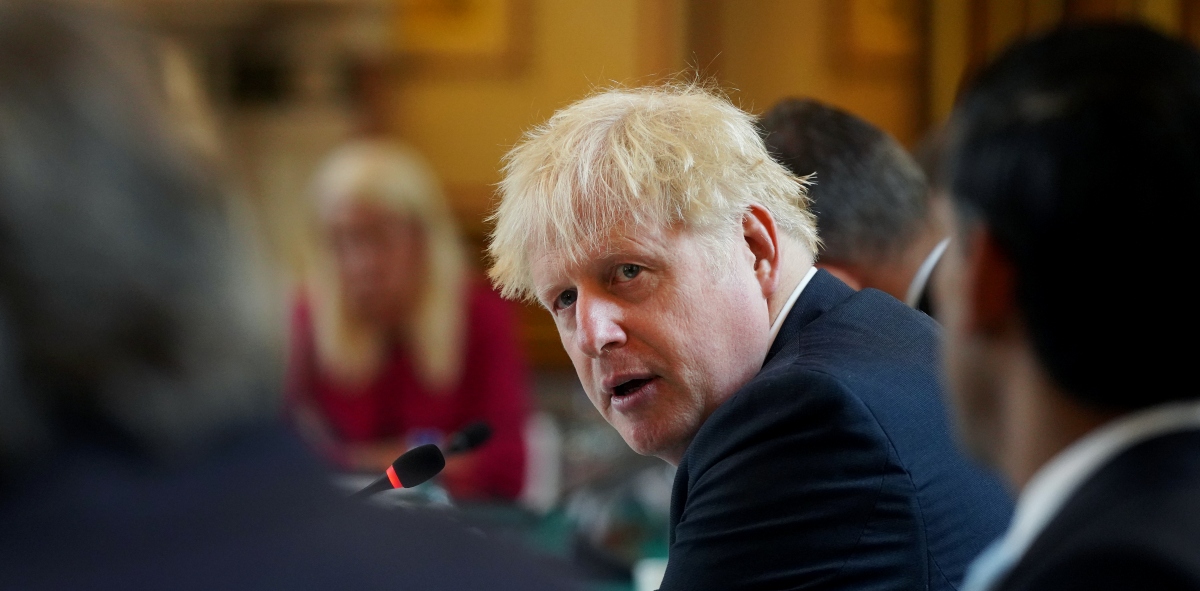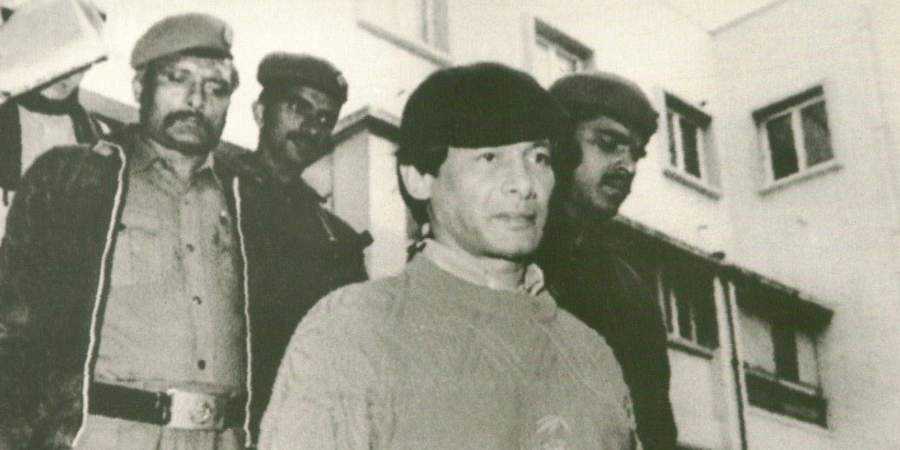Boris Johnson, Charles Sobhraj and My Experience With Truth and Lies
Boris Johnson, former prime minister of the UK, appeared for more than three hours to answer to the Privileges Committee of the Westminster parliament on March 22. The Committee was examining the charge against Johnson that he had repeatedly lied to parliament when he was in office in 2020 and 2021 about breaking the guidelines his own government had laid down for the public during COVID-19 lockdowns.
These guidelines and rules, enforceable in law, specified that social gatherings should not have more than two people attending. For work gatherings, the number of people required could gather, but they had to stay – in public and private – two metres apart. The wearing of masks was recommended, but not compulsory. All social gatherings were prohibited, including religious services; even funerals were restricted to five attendants. Even in hospitals and care homes, strict restrictions applied.
It was alleged and widely proved through photographs and even in clandestinely recorded videos that 10 Downing Street, Boris Johnson’s prime ministerial residence and office where scores of civil servants, advisors, party officials and the PM’s press office-wallas worked, had been the scene of several gatherings that broke the lockdown rules.
There were allegations and evidence that parties had been held in Downing Street, at least two of them attended by Boris Johnson himself.
When the allegations of these meetings and celebrations came to light, Johnson was forced to instigate an investigation into what became known publicly as ‘Partygate’. A senior civil servant, Sue Gray, was put in charge of the enquiry, which came to the conclusion that on several occasions, the guidelines had been traduced and rules broken, with employees smuggling in suitcases full of wine bottles into Downing Street for wild parties in which social distancing – that two-metre rule – was absolutely neglected.
When the allegations hit the press and the Gray report confirmed some of them, there was a police investigation which fined Boris Johnson and, incidentally, Rishi Sunak for being at one of those gatherings. The police fines were probably less than £150 and that certainly wouldn’t break the bank of ‘Richi’ Sunak.
Now BoJo, as he is often called, faces charges of repeatedly telling parliament that he sincerely believed that no rules had been broken over the entire period. He now acknowledges that he misinformed parliament but says he wasn’t lying. He believed, even with assurances from his political staff, that what he said to parliament was the truth.
So what the Privileges Committee – seven MPs, four of them from his own Tory party, two from Labour and one from the Scottish National Party, chaired by Labour’s Harriet Harman – have to determine is whether Boris lied to parliament. Did he know, from being there on several of the rule-breaking occasions – as any fool would – the truth and therefore lied?

Former UK Prime Minister Boris Johnson. Photo: Pippa Fowles, No 10 Downing Street/Flickr CC BY NC ND 2.0
The questioning by the committee was hard and merciless. They provided visual evidence, photographs and videos of the parties held at 10 Downing Street. Johnson vigorously asserted that these were not parties but official occasions to bid farewell to hardworking staff who were leaving the building.
He was confronted with at least three occasions when there was absolute proof that the two-metre rule that his government had laid down for the rest of the country was violated in his own offices. He argued that the space in No 10 was very cramped and the guidance allowed such an exception. When evidence of plenty of alcohol being was shared, he argued that each occasion was a work gathering.
Another point that Johnson constantly made was that he had been assured by his assistants that rules and COVID-19 restrictions had been obeyed at all times, so when he told parliament that no guidance had been transgressed, he really believed it – even though this may not have been true. The MPs grilling him asked why he didn’t rely on his own perceptions and had to ask politically appointed aides about whether the rules had been followed. Johnson's answer hinged on the question of whether he had knowingly lied or recklessly made statements which were untrue. The Committee, therefore, has to determine what was probably in his mind when he made the untrue statements. That’s a difficult thing to prove and Johnson's defence relies on that difficulty.
Whatever the committee concludes, will be put to parliament as a whole to determine whether Boris is free of all taint and therefore ready to pursue his ambition to return to the post of PM, or whether he should be sanctioned and suspended from parliament.
If parliament determines that he is guilty and the punishment should be more than ten days of suspension, then his constituency of Uxbridge in outer London can call a by-election and he will have to compete for his political existence.
Whatever the conclusion of the Privileges Committee, it is my conviction that an absolute majority of the British public sees Johnson as a liar. His private, journalistic and parliamentary life have cemented this reputation, though the charge may not pass in a court of law without arguments one way and the other till three Christmases have passed.
A lie that he did tell
Regardless of the truth of such profiling of poor BoJo, my evidence to such a court would be about one lie that I can prove he did tell.
In 1997 Charles Sobhraj, recently released from Tihar jail after 20 years imprisonment, was in Paris and called me, through a mutual contact to help him publish his memoirs. We met and over the next few days and he proposed all sorts of schemes and skulduggery to me. (No, I haven’t done anything criminal as a result!)
One of the things he asked me about, before the US and UK invasion of Iraq, was, “Fa-ook what is Wed mecuwy?” I have a physics background and told him that Red Mercury was something that the Soviet Union said they had invented as a nuclear trigger.
I knew at the time that he was dealing in redundant weapons from ex-Soviet countries and selling them to various outfits – terrorists etc. He wouldn’t tell me why he wanted to know what this substance was.

Charles Sobhraj. Photo: PTI
It was only after the invasion that it struck me to demand from him or his ex-wife why he wanted to know about red mercury. I was told that he was selling it to some Arab gentlemen in Bahrain. I called Sobhraj and asked him if these gentlemen could be Iraqis. He said, "Yes, they could." That, of course, implied that Saddam Hussein could be fishing around for nuclear capability.
However, against my ideological conviction that George Bush and Tony Blair had lied about Hussein having or planning to possess weapons of mass destruction, this seemed like a glimpse towards the possibility of them having been right. I hated that, but called Sobhraj and said he was perhaps sitting on evidence of an absolutely international story.
Also Read: When Charles Sobhraj Walked Into My Office
He said he’d come to London the next day with evidence of his meeting on red mercury with these potential Arab clients. He came. I got in touch with the only big-time British journalist I was acquainted with called Peter Oborne. He worked at the time for a weekly magazine called The Spectator, whose editor at the time was Boris Johnson. Peter said we should meet Boris for breakfast at his house the next day.
Sobhraj and I turned up there. Mrs Oborne gave us breakfast and Sobhraj told his story to Peter and Boris. Having introduced them, I left.
Boris, it turned out, thought the story too big for his weekly magazine and called the Daily Telegraph and introduced Sobhraj to a journalist called Mike – I wasn’t there. It turned out that Sobhraj demanded too much money to show The Telegraph the evidence he had. The deal didn’t work out.
Sobhraj, prompted by my realisation that his evidence was an international scoop, then determined to sell the story to the US papers and meanwhile went to Kathmandu – where he was arrested for murders he was alleged to have committed decades before and jailed for life.
In Kathmandu jail, months before he was released in December last year, a Guardian/Observer journalist called Andrew Anthony interviewed him and consequently came to ask me about some of the things Sobhraj had told him. I mentioned the fact that I had taken Sobhraj to meet Boris Johnson when he wasn’t the prime minister of the UK. Anthony got in touch with Johnson who said – or his spokesperson did, “Yes I met with Farrukh Dhondy, but I never met with the serial killer Charles Sobhraj.”
Farrukh Dhondy has published several books. His latest book The Hawk and the Hyena has a more detailed account of his conversations with Sobhraj.
This article went live on March twenty-fourth, two thousand twenty three, at eleven minutes past five in the evening.The Wire is now on WhatsApp. Follow our channel for sharp analysis and opinions on the latest developments.




